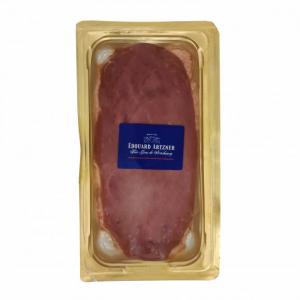Duck Breast Nature
Due to its success, this product is currently out of stock
Deliveries are made on Wednesday, Thursday and Friday
Easy and secure payment by credit card or PayPal
Delivery in over 15 countries
Freshly packed and protected
14 days in the refrigerator
2
~350g
Duck breast (EU origin), water, natural flavour, vinegar, salt, antioxidant: sodium ascorbate
Energy 1173 kJ, 282 kcal, Fat 24g of which saturated fatty acids 8,0g, Carbohydrates 0,5g of which sugars 0,5g, Protein 17g, Salt 0,76g
The duck breast, an exceptional meat
A great classic of French gastronomy, the duck breast is a prestigious piece of meat, perfect for an everyday meal or for a festive menu. We appreciate its tender and tasty meat. Ideal in all seasons, the duck breast can be eaten in spring/summer on the barbecue or grill, but also in autumn/winter in the pan, in the oven, in fondue or a la plancha.
A tender and tasty duck breast, no matter how it is cooked
We are committed to offering you quality meat that is as tender as you wish. To achieve this, our chefs use the barratage method. The duck breasts are placed in a rotating machine equipped with notches. As the meat rotates, it presses against the notches, thus relaxing the muscle fibres. The duck breasts are then marinated for several hours in a mixture of water, flavourings and salt to obtain exceptionally tender meat. For a neat presentation, our chefs will then trim each duck breast by removing the excess fat around the breast and removing the nerves from the fleshy part.
Questions / Answers
Regardless of the type of cooking you choose (rare, pink or well done), you must first cut the skin in crosswise fashion with the tip of your knife without going into the flesh.
Several cooking methods are available:
Cooking the duck breast in a pan
Heat the pan over medium heat. Place the duck breast skin side down on the pan for 5 minutes. Turn the duck breast over and continue cooking for 5 to 7 minutes.
Cooking the duck breast in the oven
Preheat the oven to 190°C. Place the duck breast in a dish, skin side down. Place in the oven for 20 minutes.
Cooking the duck breast on the barbecue
Place the barbecue grill high enough. Place the duck breast skin side down on the grill until golden brown. Turn the duck breast over and continue cooking for 8 to 10 minutes.
Cooking the duck breast a la plancha
Brown the skin on the griddle to allow the fat to drain off. Cut into 1cm thick slices. Place on the plancha until pink.
Cooking the duck breast in fondue
Cut the duck breast into small cubes. Prepare a fondue in oil or stock. Place a cube of meat on the end of a pick and plunge it into the boiling liquid until it is cooked.
Purists may enjoy a simply pan-fried duck breast, but there is nothing to stop you from waking up the cook in you. A variety of recipes are available, from the simplest to the most elaborate: duck breast with raspberry sauce, pepper sauce, orange sauce, mirabelle plum sauce, peach sauce or even glazed duck breast
You can accompany your duck with a few crunchy vegetables, rice, fresh pasta, chips or a creamy purée. The duck breast also goes wonderfully well with asparagus, sweet potato, carrot or fennel. In terms of fruit, the best combinations are cherries, peaches, apricots, apples, pears, figs or dried fruit such as prunes.
Duck breast is a powerful meat, so it should be accompanied by a wine that can match this power. We recommend a Pinot Gris or Noir from Alsace.

